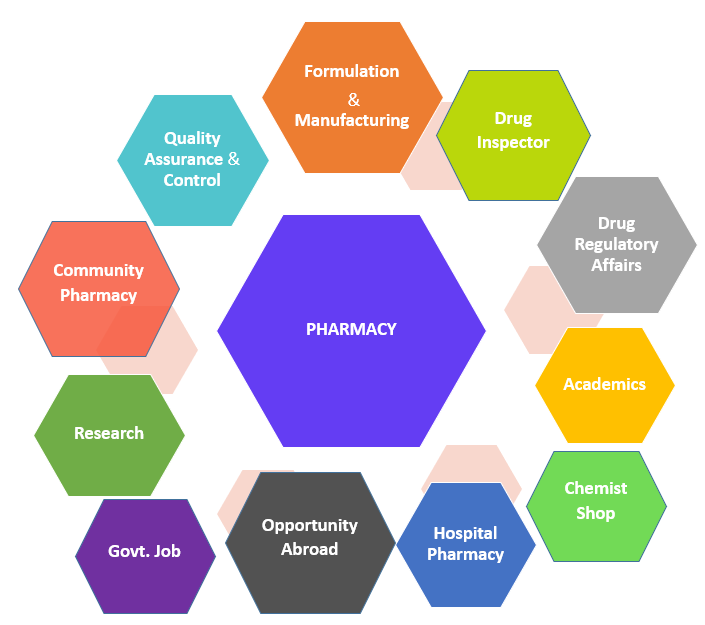Scope of Pharmacy
Scope of Pharmacy

Introduction
The world is changing so swiftly these days that working in pharmacy is becoming a feasible and fulfilling career option. The four-year undergraduate Bachelor of Pharmacy degree, usually known as a B. Pharm, equips students with the knowledge and abilities required to function as chemists. A Bachelor of Pharmacy degree offers numerous advantages after completing the 12th grade, including the capacity to serve people and work potential, job security, financial stability, and professional progress. This piece will examine the various causes.
why B. Pharm is thought to be the best course to take after 12th grade, with a focus on the opportunities and benefits it gives.
Obtaining a Bachelor of Pharmacy degree following high school is highly advantageous since it provides numerous career options. The role of pharmacists in the healthcare sector is crucial. They can work in a wide range of settings, including government organizations, retail pharmacies, hospitals, and pharmaceutical firms. In addition to administering prescriptions, they also provide information about medications, oversee drug therapy, and increase patient awareness of health issues.
Chemists can also specialise in fields like clinical pharmacy, industrial pharmacy, pharmacovigilance, regulatory affairs, and pharmaceutical management, which gives them a lot more job possibilities.
Below is a list of the different kinds of jobs and options that B. Pharm. graduates in India can get:
Pharmacist: With a Bachelor of Pharmacy degree, pharmacists are qualified to work in clinics, hospitals, and retail establishments. They are responsible for the distribution of medications, educating patients about the proper usage and interactions with medications, and ensuring patient safety.
Pharmaceutical Industry: People with a Bachelor of Pharmacy can work in a wide range of sectors, including research and development, quality control, production, sales, and marketing, because the pharmaceutical industry in India is expanding so swiftly. These individuals can be employed by manufacturing facilities, contract research organizations (CROs), and pharmaceutical corporations.
Regulatory Affairs: Those with a bachelor’s degree in pharmacy who wish to work in regulatory affairs can apply. Applicants in this field are responsible for ensuring that legal criteria are fulfilled and obtaining approval for clinical trials, marketing, and pharmaceutical research.
Drug Inspector: Graduates of the Bachelor of Pharmacy program may potentially decide to become drug inspectors for government regulatory agencies. They are responsible for monitoring drug laws and regulations, inspecting production facilities, and ensuring the quality of pharmaceuticals produced is up to par.
Pharmacovigilance: As the topic of pharmaceutical safety receives more attention, there is a growing demand for qualified professionals in the field of pharmacovigilance. Bachelor of Pharmacy school graduates can find employment in pharmacovigilance departments, where they monitor and report adverse drug responses and make sure prescription drugs are taken as directed.
Entrepreneurship: Pharmacy students can launch their own retail pharmacies or pharmaceutical manufacturing facilities with a Bachelor of Pharmacy degree and a strong sense of entrepreneurship. Additionally, they can pursue careers in complementary sectors including herbal medicine, nutraceuticals, and cosmeceuticals.
It is crucial to remember that the extent and opportunities could vary based on a number of factors, such as location, prior experience, additional credentials, and market conditions. Numerous avenues for career progression are available in the pharmaceutical industry, such as lifelong learning, industrial training programs, and apprenticeships.
Contribution to Society and Patient Care
Graduates of the Bachelor of Pharmacy program have a unique opportunity to significantly impact society by improving patient care and medication safety. Experts in drugs, pharmacists help avoid drug-related issues, provide guidance on drug interactions and adverse effects, promote responsible drug use, and maximize therapeutic outcomes. They accomplish this by supporting appropriate pharmacy practises, organizing health education activities, and participating in immunisation drives. The general health of the populace is enhanced by this. Those pursuing a bachelor’s degree in pharmacy have the opportunity to significantly enhance both the general public’s health and the lives of others.
The importance of chemists in healthcare systems is best illustrated by the COVID-19 pandemic. They were largely responsible for halting the disease’s spread. During this trying time, chemists have accomplished a lot of noteworthy things, such as the following:
Ensuring Access to Medications : Ensuring patients have continuous access to essential medications Chemists have played a major role in providing patients with continuous access to essential medications. Despite the lockdowns and restrictions, they have been working incredibly hard to fill prescriptions, teach patients how to take their medications correctly, and offer people guidance on how to manage chronic diseases.
Vaccine Administration: The Covid-19 vaccination is administered by chemists. They constructed immunization centers, trained personnel in the administration and management of vaccines, and immunized millions of people in an effort to help stop the illness’s spread.
Medication Management and Adherence: Throughout the pandemic, chemists have assisted in controlling the supply of medications, averting shortages, and guaranteeing appropriate use. They provided guidance on over-the-counter medications, drug interactions, and medicine shortages.
Addressing Misinformation: Pharmacy experts have aided in educating the public and clearing up misconceptions. They dispelled myths regarding COVID-19 therapy, promoted wellness, and emphasized the importance of utilizing trustworthy information.
Collaboration with Healthcare Teams: Chemists, together with physicians, nurses, and public health experts, have designed Covid-19 treatment. They have actively helped interprofessional teams by offering therapeutic approaches and knowledge of drug administration.
